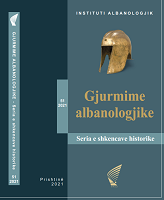KONFERENCA E BUJANIT GUR THEMELI I SHTETËSISË SË KOSOVËS
BUJAN CONFERENCE CORNERSTONE OF KOSOVO STATEHOOD
Author(s): Alban DobrunaSubject(s): Politics and society, WW II and following years (1940 - 1949), Post-War period (1950 - 1989), Fascism, Nazism and WW II
Published by: Instituti Albanologjik i Prishtinës
Keywords: National Liberation Movement; Kosovo; Anti-Fascist Movement;
Summary/Abstract: The National Liberation Movement in Kosovo, after strengthening its military and political position in the end of 1943, and as it became increasingly clear that the end of World War II was approaching, Fadil Hoxha, one of the leading figures of the Anti-Fascist Movement in Kosovo, proposed that the Bujan Conference to be held on 31 December 1943 and 1 and 2 January 1944 in the village of Bujan in the Gjakova Highlands. The most important thing, on the basis of which this conference is mentioned, is that it conveyed the will of the people of Kosovo and its alignment with the anti-fascist allies. The resolution, which, among other things, states that the Albanian people of Kosovo and the Dukagjini Plain, expresses its free will that after the war, Kosovo joins the mother country - Albania. The Bujan Conference and its decisions have a special importance in the Albanian history, as they became the points of support and the most important and legitimate arguments of the demands of the Albanians for the independence of Kosovo and self-determination.
Journal: Gjurmime Albanologjike - Seria e shkencave historike
- Issue Year: 2021
- Issue No: 51
- Page Range: 159-170
- Page Count: 12
- Language: Albanian
- Content File-PDF

